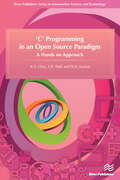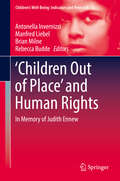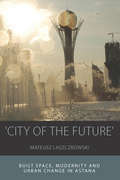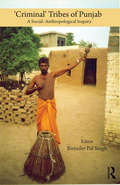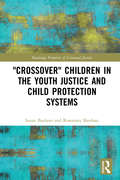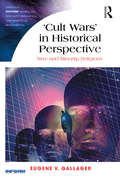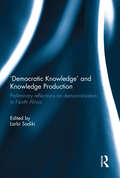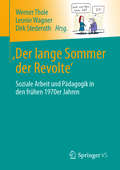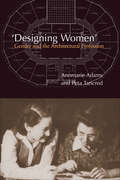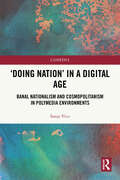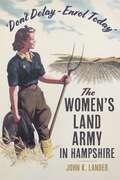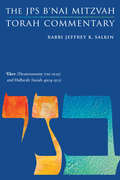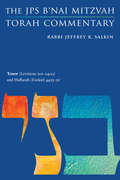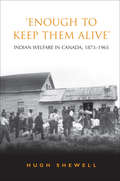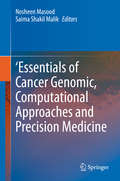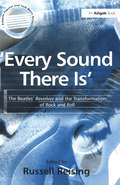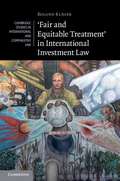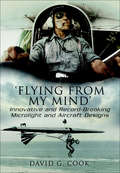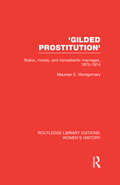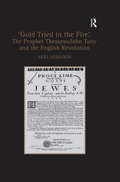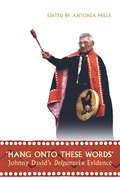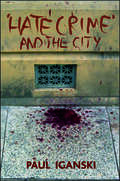- Table View
- List View
'C' Programming in an Open Source Paradigm
by K. S. Oza S. R. Patil R. K. KamatOver the period of last few decades, the ‘C’ language has become an icon for computer programmers. The field of computer science has undergone tremendous change, and the rate of obsolescence of concepts, programming platforms, tools and utilities is extremely high. However, in spite of such vast changes, the only thing that has retained its stability is the ‘C’ language. Even today, millions of students, hobbyists and professional programmers enjoy the sturdiness, reliability and user friendliness of the ‘C’ language. Today ‘C’ enjoys the undisputable recognition in the computing paradigm for diversified applications, from the basic programming, microcontrollers, and spreadsheets to system programming. In this book, most of the usual theoretical features have been skipped, for these have been widely published in previous books. Rather than introducing the underpinning theory, the authors approach has been “learning-through-doing”, which is one that often appeals to programmers. Theory is followed by practical implementation, and in this way the book will cover programming aspects in a self-tutor manner providing an excellent overview, from basic to advance programming. Topics discussed include: • GCC interface• First time ‘C’ User• Decision and looping structures• Arrays and pointers• Functions, structures and union• Linear data structures
'COME FARE UN LIBRO'
by Ana Claudia Antunes Gaia BrivioUn libro che insegna il vecchio metodo del fai-da-te, ottimo per creare diari, agende e giornali. Per i vostri viaggi, per persone creative, per amanti dei libri e delle vecchie tecniche, per artisti ed educatori. Non vi siete mai chiesti come viene fatto un libro? O addirittura pensato di crearne uno da regalare o per interesse personale? Seguendo delle semplici istruzioni illustrate, questo libro descrive passo dopo passo un metodo 'easy-to-make and ready-to-take' che può essere applicato a differenti motivi, temi o usi. Questo libro farà sì che vi riempiate di bellissimi, smaglianti, squisiti, indimenticabili altri libri. Tutto dipende da voi. Siete pronti?
'Children Out of Place' and Human Rights: In Memory of Judith Ennew (Children’s Well-Being: Indicators and Research #15)
by Brian Milne Antonella Invernizzi Manfred Liebel Rebecca BuddeThis volume brings together tributes to Judith Ennew's work and approach based on issues related to children she once referred to as 'out of place', that is to say children whose living conditions and ways of life appear far removed from Western images of childhood. It includes contributions on working children, children living on the street, orphans and victims of sexual exploitation. It covers developments and concepts used by Judith Ennew with an emphasis on perspectives of children's human rights, their participation, cultural sensitivity, research methodology, methods, ethics, monitoring, policy making and programming. In so doing, it brings together material that form a holistic view of not only her way of thinking, but of a policy and programming agenda developed by a number of researchers, academics and activists since the adoption of the UN Convention on the Rights of the Child.
'City of the Future': Built Space, Modernity and Urban Change in Astana (Integration and Conflict Studies #14)
by Mateusz LaszczkowskiAstana, the capital city of the post-Soviet Kazakhstan, has often been admired for the design and planning of its futuristic cityscape. This anthropological study of the development of the city focuses on every-day practices, official ideologies and representations alongside the memories and dreams of the city's longstanding residents and recent migrants. Critically examining a range of approaches to place and space in anthropology, geography and other disciplines, the book argues for an understanding of space as inextricably material-and-imaginary, and unceasingly dynamic – allowing for a plurality of incompatible pasts and futures materialized in spatial form.
'Crimes against Peace' and International Law
by Kirsten SellarsIn 1946, the judges at the International Military Tribunal at Nuremberg declared 'crimes against peace' - the planning, initiation or waging of aggressive wars - to be 'the supreme international crime'. At the time, the prosecuting powers heralded the charge as being a legal milestone, but it later proved to be an anomaly arising from the unique circumstances of the post-war period. This study traces the idea of criminalising aggression, from its origins after the First World War, through its high-water mark at the post-war tribunals at Nuremberg and Tokyo, to its abandonment during the Cold War. Today, a similar charge - the 'crime of aggression' - is being mooted at the International Criminal Court, so the ideas and debates that shaped the original charge of 'crimes against peace' assume new significance and offer valuable insights to lawyers, policy-makers and scholars engaged in international law and international relations.
'Criminal' Tribes of Punjab
by Birinder Pal SinghOne of the important projects launched by the British government in the late 19th century was the preparation of a detailed census of the demographic profile of the Indian population across the country. Unable to understand the cultural pluralism that characterizes Indian unity in variety, the census was riddled with problems of definition and categories. This book is a comprehensive ethnographic account of seven tribes in Punjab, classified as ‘criminal’ by the British administration, in order to make some sense of their alleged criminality: Bauria, Bazigar Banjara, Bangala, Barad, Gandhila, Nat and Sansi. The problem of definition of tribe and the issue of criminality are discussed critically. More importantly, the book shows that, contrary to the claims of the Punjab government, these ‘ex-criminal’ tribes still exist and constitute the poorest of the poor in an otherwise prosperous state. It also addresses to a significant current development of various Denotified Tribes’ Associations in Punjab (and other states as well) that have already started raking their long pending demand of Scheduled Tribe status. It is suggested that if their demands are not suitably addressed to they may take recourse to the Gujjar way of resolving conflict as in Rajasthan. As tribes the world over are slowly facing extinction, this important book will serve to archive the ethnographies of these ‘ex-criminal’ tribes. An unusual feature of the book is the voices of a few of the elderly in these tribes whose reminiscences about their traditions, beliefs and practices have been documented. The book will be valuable for those in the fields of sociology, anthropology, social history, tribal and ethnic studies, cultural and folk studies.
'Crossover' Children in the Youth Justice and Child Protection Systems (Routledge Frontiers of Criminal Justice)
by Rosemary Sheehan Susan Baidawi"Crossover" Children in the Youth Justice and Child Protection Systems explores the outcomes faced by the group of children who experience involvement with both child protection and youth justice systems across several countries, including the United States, United Kingdom, Canada, New Zealand, and Australia. Situated against a backdrop of international evidence and grounded in a two-year study with the Children’s Court in Victoria, Australia, this book presents a cohesive picture of the backgrounds, characteristics, and pathways traversed by crossover children. It presents statistical data from 300 crossover Children’s Court case files, alongside the expert evidence of 82 professionals, to generate a comprehensive picture of the lives of crossover children, and the individual and systemic challenges that they face. The book investigates the crucial question of why some children involved with child welfare systems experience particularly poor criminal justice outcomes, demonstrating how the convergence of cumulative childhood adversity, complex support needs, and systemic disadvantage produces acutely damaging outcomes for some crossover youth. It outlines the implications of the study, including how these findings might shape diversion and differential justice system responses to child protection-involved youth, and the innovative approaches adopted internationally to avert the care to custody pathway. This book is internationally relevant and will be of great interest to students and scholars of criminology and law, social work, psychology, and sociology, as well as legal, welfare, and government agencies and policy developers, non-government peak bodies and services, professional probation services, case managers, health and mental health services, disability and drug treatment agencies, and others who work with both young offenders and the design and implementation of policy and legislation.
'Cult Wars' in Historical Perspective: New and Minority Religions (Routledge Inform Series on Minority Religions and Spiritual Movements)
by Eugene V. Gallagher'Cult Wars' in Historical Perspective provides a broad characterization of the shifting religious contours over the past several decades. Offering an assessment of several important topics in the study of new religions, this book explores developments in well-known groups such as the Unification movement, The Family International (Children of God), the International Society for Krishna Consciousness (ISKCON), and the Church of Scientology. Bringing together both insiders and outsiders from various academic disciplines and personal perspectives, this book takes account of the ways in which the cult question is defined and addressed in different countries. It offers a vivid depiction of how the cult wars or cult controversies of the late twentieth and early twenty-first centuries first took shape; the transformation of deeply entrenched positions on cults and sects as at least some members of new groups, cult watchers,and academics entered into serious and sustained conversations about topics of mutual concern; the shifting foci and concerns of the general public, law enforcement and the courts, and academics in various countries; and the complex histories of individual groups in which many dramatic transformations have occurred despite their comparatively short life spans.
'Democratic Knowledge' and Knowledge Production: Preliminary Reflections on Democratisation in North Africa
by Larbi SadikiSudden change in North Africa manifested through popular protests followed by the end of authoritarian regimes in Tunisia, Egypt and Libya revitalised the scholarly concern with democracy in the region. Democratisation and democracy received fresh attention in the ‘Arab Spring’. Arab citizens displayed their grasp and possession of ‘democratic knowledge’ in a bottom-up groundswell of activism against the wielding of power by authoritarian regimes. In this book, the investigation into democratic knowledge revolves around the idea that good government must be in the first instance rooted in a local system of knowledge. However, no privileging of the ‘local’ is offered here at the expense of the ‘democratic’. Each chapter illustrates the context-specific experiences which provide political actors with the wherewithal in actively learning democracy. The countries examined with reference to a socially constructed democratic knowledge include Algeria, Libya, Morocco, Tunisia and Egypt. Critical focus on local agency in North Africa during the ‘Arab Spring’ enables a shift from democratisation as an ideology to a ‘democratic learning turn’. This book was originally published as a special issue of the Journal of North African Studies.
'Der lange Sommer der Revolte': Soziale Arbeit und Pädagogik in den frühen 1970er Jahren
by Leonie Wagner Werner Thole Dirk StederothDie 1970er Jahre sind ohne das, was mit 1968 verbunden wird, kaum zu verstehen und die Ereignisse von 1968 würden möglicherweise heute in ihrer Bedeutung ohne die Veränderungen im darauffolgenden Jahrzehnt geringer eingeschätzt.In dem vorliegenden Band wird an Veränderungen im weiten Feld der Sozialen Arbeit und Erziehungswissenschaft zu Beginn der 1970er Jahre erinnert. Gerahmt werden diese Erinnerungen und kritischen Reflexionen durch Beiträge, die Ereignisse, Auseinandersetzungen und die Suche nach einem neuen Politik- und Kulturverständnis am Ende der 1960er Jahre illustrieren. Neben Beiträgen von Zeitzeug*innen wurden jüngere Wissenschaftler*innen gebeten, die Entwicklung aus ihrer Perspektive zu beleuchten.Die Herausgeber*innenProf. Dr. Werner Thole ist Hochschullehrer an der Universität Kassel.Prof.in Dr. Leonie Wagner ist Hochschullehrerin an der HAWK Holzminden.Prof. Dr. Dirk Stederoth ist Hochschullehrer am Institut für Philosophie der Universität Kassel.
'Designing Women': Gender and the Architectural Profession
by Annmarie Adams Peta TancredHistorically, the contributions of women architects to their profession have been minimized or overlooked. 'Designing Women' explores the tension that has existed between the architectural profession and its women members. It demonstrates the influence that these women have had on architecture in Canada, and links their so-called marginalization to the profession's restrictive and sometimes discriminatory practices. Co-written by an architectural historian and a sociologist, this book provides a welcome blend of disciplinary approaches. The product of much original research, it looks at issues that are specific to architecture in Canada and at the same time characteristic of many male-dominated workplaces. Annmarie Adams and Peta Tancred examine the issue of gender and its relation to the larger dynamics of status and power. They argue that many women architects have reacted with ingenuity to the difficulties they have faced, making major innovations in practice and design. Branching out into a wide range of alternative fields, these women have extended and developed what are considered to be the core specializations within architecture. As the authors point out, while the profession designs women's place within it, women design buildings and careers that transcend that narrow professional definition.
'Doing Nation' in a Digital Age: Banal Nationalism and Cosmopolitanism in Polymedia Environments (Comedia)
by Sanja VicoThis book introduces a new theory of national identity, arguing that the nation does not only represent an abstract “imagined community” but also represents embodied cultural and discursive practices.Drawing upon a detailed case study of Serbian Londoners, this truly interdisciplinary study positions media as constitutive of national identities. The author contends that nations come into being and are sustained through everyday interpersonal communication practices that have increasingly become mediated, especially for migrants. She develops the concept of "doing nation" to argue that we should think of the nation as a dynamic process. Situated first within a particular migration context, the concept is then applied more broadly as everyday communication practices are becoming increasingly mediated worldwide.Covering a breadth of key theories and concepts in this field, including diaspora, ethnicity, nationalism, cosmopolitanism, social media affordances and polymedia, this book will appeal to scholars and students researching digital media, migration, identities, nationalism and cosmopolitanism in the social science disciplines.
'Don’t Delay - Enrol Today': The Women's Land Army in Hampshire
by John K. LanderThe employment of female labour on farms during two world wars was essential to replace thousands of men who relinquished agricultural jobs to join the armed forces. ‘Land girls’, the majority of them from urban districts, maintained supplies of grain, horticultural products and livestock, succeeding in overcoming substantial reductions in food imports caused by disruptive enemy action to the pattern of shipping trade.Hampshire played a major part in the national selection, training and placing of land girls on farms. They undertook hard, physical work in all weathers for many hours a day, often a long way from home. It is generally agreed that Women’s Land Army members received inadequate recognition for their valuable contributions.Seventy-five years after the final disbandment of the Women’s Land Army, this book intends to correct that deficiency and shed light on its invaluable work.
'Ekev: The JPS B'nai Mitzvah Torah Commentary (JPS Study Bible)
by Rabbi Jeffrey K. SalkinThe JPS B’nai Mitzvah Torah Commentary shows teens in their own language how Torah addresses the issues in their world. The conversational tone is inviting and dignified, concise and substantial, direct and informative. Each pamphlet includes a general introduction, two model divrei Torah on the weekly Torah portion, and one model davar Torah on the weekly Haftarah portion. Jewish learning—for young people and adults—will never be the same. The complete set of weekly portions is available in Rabbi Jeffrey K. Salkin’s book The JPS B’nai Mitzvah Torah Commentary (JPS, 2017).
'Emor: The JPS B'nai Mitzvah Torah Commentary (JPS Study Bible)
by Rabbi Jeffrey K. Salkin'Emor (Leviticus 21:1-24:23) and Haftarah (Ezekiel 44:15-31): The JPS B’nai Mitzvah Torah Commentary shows teens in their own language how Torah addresses the issues in their world. The conversational tone is inviting and dignified, concise and substantial, direct and informative. Each pamphlet includes a general introduction, two model divrei Torah on the weekly Torah portion, and one model davar Torah on the weekly Haftarah portion. Jewish learning—for young people and adults—will never be the same. The complete set of weekly portions is available in Rabbi Jeffrey K. Salkin’s book The JPS B’nai Mitzvah Torah Commentary (JPS, 2017).
'Enduring Freedom' Abuses by U. S. Forces in Afghanistan
by Human Rights WatchOn Afghan soil, the United States is maintaining a system of arrests and detention as part of its ongoing military and intelligence operations that violates international human rights law and international humanitarian law (the laws of war). In doing so, the United States is endangering the lives of Afghan civilians, undermining efforts to restore the rule of law in Afghanistan, and calling into question its commitment to upholding basic rights.
'Enough to Keep Them Alive'
by Hugh E.Q. ShewellFar from being a measure of progress or humanitarian aid, Indian welfare policy in Canada was used deliberately to oppress and marginalize First Nations peoples and to foster their assimilation into the dominant society. 'Enough to Keep Them Alive' explores the history of the development and administration of social assistance policies on Indian reserves in Canada from confederation to the modern period, demonstrating a continuity of policy with roots in the pre-confederation practices of fur trading companies.Extensive archival evidence from the Indian Affairs record group at the National Archives of Canada is supplemented for the post-World War Two era by interviews with some of the key federal players. More than just an historical narrative, the book presents a critical analysis with a clear theoretical focus drawing on colonial and post-colonial theory, social theory, and critiques of liberalism and liberal democracy.
'Essentials of Cancer Genomic, Computational Approaches and Precision Medicine
by Nosheen Masood Saima Shakil MalikThis book concisely describes the role of omics in precision medicine for cancer therapies. It outlines our current understanding of cancer genomics, shares insights into the process of oncogenesis, and discusses emerging technologies and clinical applications of cancer genomics in prognosis and precision-medicine treatment strategies. It then elaborates on recent advances concerning transcriptomics and translational genomics in cancer diagnosis, clinical applications, and personalized medicine in oncology. Importantly, it also explains the importance of high-performance analytics, predictive modeling, and system biology in cancer research. Lastly, the book discusses current and potential future applications of pharmacogenomics in clinical cancer therapy and cancer drug development.
'Every Sound There Is': The Beatles' Revolver and the Transformation of Rock and Roll
by Russell Reising'Every Sound There Is': Revolver and the Transformation of Rock and Roll assesses and celebrates the Beatles' accomplishment in their 1966 masterpiece. The essays of Every Sound There Is examine Revolver from a large number of complementary starting points that help us to understand both the album's contemporary creation and reception and the ways in which it continues to shape the creation and reception of popular music in the twenty-first century. Responding to the incredible diversity of Revolver, this gathering of international scholars focuses on the Beatles' 1966 album as one of rock and roll history's threshold moments. Bringing to bear approaches from the disciplines of musicology, cultural studies, poetics, gender studies, these essays address matters as diverse as the influence of American R&B on Revolver as well as its influence on Pink Floyd, each Beatle‘s contributions to the album, the musicological significance of the Beatles' harmonies and chord progressions, its status and coherence as a work of art, the technological and marketing significance of Revolver's recording and distribution, and its influence on the development of rock music.
'Fair and Equitable Treatment' in International Investment Law
by Roland KlägerA breach of fair and equitable treatment is alleged in almost every investor-state dispute. It has therefore become a controversial norm, which touches many questions at the heart of general international law. Roland Kläger sheds light on these controversies by exploring the deeper doctrinal foundations of fair and equitable treatment and reviewing its contentious relationship with the international minimum standard. The norm is also discussed in light of the fragmentation of international law, theories of international justice and rational balancing, and the idea of constitutionalism in international law. In this vein, a shift in the way of addressing fair and equitable treatment is proposed by focusing on the process of justificatory reasoning.
'Flying from My Mind': Innovative and Record-Breaking Microlight and Aircraft Designs
by David G. CookThe memoirs of a hang glider pilot and pioneer and his first-hand account of designing the revolutionary Shadow microlight aircraft. This fascinating story begins in 1973 when David Cook built a glider in an attempt to win the Selsey Birdman Rally—an annual event where all types of creations are launched from the end of Bognor Pier. Between 1975 and 1977 he won every National and International hang gliding competition entered, and then in 1977 he designed and built a power unit for his glider. In 1978 it became the first and lowest-powered microlight to cross the English Channel. Cook&’s successes in this venture led to sponsorship from Duckhams Oils and there followed a period of demonstration flights at major air shows. In 1982 he designed a microlight called Shadow and in 1983 it took the FAI world speed and distance records for the class. In 1992 he took the aircraft to 23,600 ft to claim the world altitude record for the class, beaten later by himself in a newly designed Streak to 27,150 ft. David started a company to build the Shadow in 1984 and has demonstrated its remarkable flying abilities around the world, during which time he had many amusing and some exciting experiences. In 1987 the Shadow won the British Design Award.
'Gilded Prostitution': Status, Money and Transatlantic Marriages, 1870-1914 (Routledge Library Editions: Women's History)
by Maureen E. MontgomeryThis book examines the marriages of British peers to American women within the context of the opening up of London and New York society and the growing competitiveness for high social status. In London, American women were often blamed for the growing hedonism and materialism of smart society and for poaching in the marriage market. They were invariably described as frivolous, vain and calculating – a description which points to the simmering anti-American sentiment in Britain. It was even suggested that titled Americans were having a detrimental effect on the British peerage because of their failure to produce male heirs. A brilliant analysis of the reasons why American women were viewed pejoratively not only in terms of anti-American feeling and the social transformation of the British upper class, but also the threat of women who did not appear to conform to aristocratic notions of a peeress’s duties as a wife and mother.Originally published in 1989, this book has unique appendices listing details of peer marriages in this 1870-1914 period.
'Gold Tried in the Fire'. The Prophet TheaurauJohn Tany and the English Revolution
by Ariel HessayonThis is a study of the most fascinating and idiosyncratic of all seventeenth-century figures. Like its famous predecessor The Cheese and The Worms: The Cosmos of a Sixteenth-Century Miller, it explores the everyday life and mental world of an extraordinary yet humble figure. Born in Lincolnshire with a family of Cambridgeshire origins, Thomas Totney (1608-1659) was a London puritan, goldsmith and veteran of the Civil War. In November 1649, after fourteen weeks of self-abasement, fasting and prayer, he experienced a profound spiritual transformation. Taking the prophetic name TheaurauJohn Tany and declaring himself 'a Jew of the Tribe of Reuben' descended from Aaron the High Priest, he set about enacting a millenarian mission to restore the Jews to their own land. Inspired prophetic gestures followed as Tany took to living in a tent, preaching in the parks and fields around London. He gathered a handful of followers and, in the week that Cromwell was offered the crown, infamously burned his bible and attacked Parliament with sword drawn. In the summer of 1656 he set sail from the Kentish coast, perhaps with some disciples in tow, bound for Jerusalem. He found his way to Holland, perhaps there to gather the Jews of Amsterdam. Some three years later, now calling himself Ram Johoram, Tany was reported lost, drowned after taking passage in a ship from Brielle bound for London. During his prophetic phase Tany wrote a number of remarkable but elusive works that are unlike anything else in the English language. His sources were varied, although they seem to have included almanacs, popular prophecies and legal treatises, as well as scriptural and extra-canonical texts, and the writings of the German mystic Jacob Boehme. Indeed, Tany's writings embrace currents of magic and mysticism, alchemy and astrology, numerology and angelology, Neoplatonism and Gnosticism, Hermeticism and Christian Kabbalah - a ferment of ideas that fused in a millenarian yearning for the hoped for
'Hang Onto These Words': Johnny David's Delgamuukw Evidence
by Antonia MillsIn 1985 and 1986, ninety-year-old Witsuwit'en Chief, Maxlaxlex – or Johnny David as he is better known - was the first Witsuwit'en to give Commission Evidence in the Delgamuukw land claims case in which the Witsuwit'en and Gitxsan of Northern British Columbia were battling for title to their traditional territories. 'Hang Onto These Words' presents the actual transcripts of the questions and answers between lawyers working on both sides and this knowledgeable and outspoken Native elder who spoke in his own language and whose words were then translated by an interpreter into English. The evidence was given in a makeshift courtroom set up in David's own home. Anthropologist Antonia Mills was present during these proceedings, and in this book, she introduces and contextualizes the evidence within the Delgamuukw case. In his testimony, David provides a rich description of the Witsuwit'en way of life as well as the injustices suffered at the hands of Indian agents and settlers. He ends his testimony saying, "If you hang on to these words, everything will be all right." The challenge of hearing his voice, and using it to negotiate the meaning and substance of Aboriginal rights remains unresolved and resonant.
'Hate crime' and the city
by Paul IganskiThe impression often conveyed by the media about hate crime offenders is that they are hate-fuelled individuals who, in acting out their extremely bigoted views, target their victims in premeditated violent attacks. Scholarly research on the perpetrators of hate crime has begun to provide a more nuanced picture. But the preoccupation of researchers with convicted offenders neglects the vast majority of hate crime offenders that do not come into contact with the criminal justice system. This book, from a leading author in the field, widens understanding of hate crime by demonstrating that many offenders are ordinary people who offend in the context of their everyday lives. Written in a lively and accessible style, the book takes a victim-centred approach to explore and analyse hate crime as a social problem, providing an empirically informed and scholarly perspective. Aimed at academics and students of criminology, sociology and socio-legal studies, the book draws out the connections between the individual agency of offenders and the background structural context for their actions. It adds a new dimension to the debate about criminalising hate in light of concerns about the rise of punitive and expressive justice, scrutinizing the balance struck by hate crime laws between the rights of offenders and the rights of victims.
